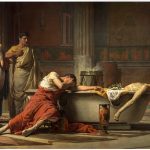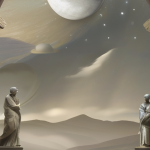This year’s HI Seminar explores the question: Can we know reality? In the Fall we explore the work of various thinkers in Antiquity on this question, turning to Modernity in the Spring 2024.
One way to understand the beginning of modern philosophy is to imagine a world where key “truths” you and your peers have mostly taken for granted turn out to be false. The earth, it turns out, was not at the center of the universe. Christendom was not one unified, unchanging heavenly kingdom–the Catholic Church–but a fragmented cluster of communities that arose out of the Protestant Reformation. As if that were not enough, philosophers were re-discovering arguments from Ancient Skepticism. Hence, one way to understand philosophy in modernity is as a quest for certainty. Who or what can we trust and how can we be absolutely certain of having arrived at truth? Such are the questions Rene Descartes (1596-1650) and his intellectual descendants inherited.
In this reading group we’ll take a tour–necessarily selective–of philosophers from Descartes onward focusing on our ability to know reality. Next, we’ll explore some of David Humes’ (1711-1776) classic skeptical arguments–a challenge to Descartes and the other main philosophers of the time. Next, we’ll look at responses to Hume from thinkers such as Kant (1724-1804) and Thomas Reid (1710-1796). We’ll also explore how Hegel (1770-1831) responds to and develops Kant’s insights. Finally, we’ll close with the work of a 20th century philosopher–a devotee of Aristotle and Thomas Aquinas–Etienne Gilson (1884-1978). In Gilson’s view, the best reply to Descartes–how can we be absolutely certain?–is to show that, ultimately, it’s a bad question.
Led by Dr. Victor Saenz
Email jprather@houstoninstitute.org to RSVP.



